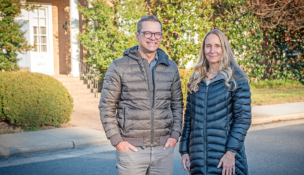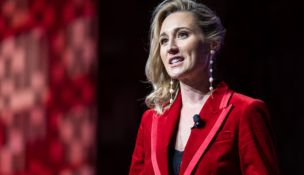Tiny Cargo gets big local support
When newly minted biomedical company Tiny Cargo began looking for a manufacturing facility, the Roanoke community sprang into action.

Robert Gourdie founded Tiny Cargo, the first startup from Virginia Tech’s Fralin Biomedical Research Institute at VTC. Photo by Don Petersen

Robert Gourdie founded Tiny Cargo, the first startup from Virginia Tech’s Fralin Biomedical Research Institute at VTC. Photo by Don Petersen
Tiny Cargo gets big local support
When newly minted biomedical company Tiny Cargo began looking for a manufacturing facility, the Roanoke community sprang into action.
In a bid to keep the startup local, the Roanoke Regional Partnership found a 10,800-square-foot warehouse to renovate and looped in Roanoke Valley Development Corp. and Greater Roanoke Valley Development Foundation, which jointly purchased the building and offered Tiny Cargo favorable leasing terms.
“If a place has the real estate solution to offer a business, it is in the running for opportunities,” says the partnership’s executive director, John Hull, emphasizing the importance of biomedical in diversifying the regional economy.
Tiny Cargo is the first commercial manufacturing concern to emerge from Virginia Tech’s Fralin Biomedical Research Institute at VTC, where the company’s founder and president, Robert Gourdie, is a professor and leader of Fralin’s Gourdie Lab and director of the institute’s Center for Vascular and Heart Research.
Tiny Cargo’s new facility, the first clean room for commercial biotech manufacturing in the region, will produce exosomes — nano-sized vesicles that carry nucleic acids, proteins, lipids and metabolites among cells. Using proprietary methods, Tiny Cargo will be the first company to produce exosomes at scale from cow’s milk, which they will sell for preclinical research and to develop Xolacta, a drug to treat the side effects of radiation.
With FDA approval, these efforts could eventually provide a better way to deliver drugs to the body’s cells — and potentially spark a revolution in pharmaceutical production.
“These exosomes are effectively orally administered, bypass the gut-blood barrier, navigate through internal barriers and are not removed by the liver,” says Spencer Marsh, Tiny Cargo’s chief scientific officer. “This could potentially replace engineered, plastic-based delivery systems.”
Having an FDA-approved manufacturing facility is key to moving both Tiny Cargo’s exosome production process and Xolacta toward clinical trials. To cover the buildout, Tiny Cargo has secured $925,000 from venture funders, angel investors and local donors.
“I’ve been astounded by the support from the city, various business development entities in the area and the network of high-profile businesspeople,” says Alan Gourdie, Tiny Cargo’s New Zealand-based CEO and Robert Gourdie’s brother. “They all share a common vision for the future of Roanoke and that is to rejuvenate its manufacturing and employment base through high-technology capabilities.”
s

















